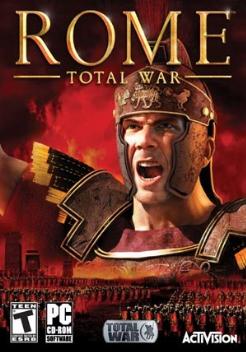Rome: Total War
| Rome: Total War | |
|---|---|
 |
|
| Developer(s) | The Creative Assembly |
| Publisher(s) |
Activision (Original) Sega (Current) Feral Interactive (Mac OS X, iOS) |
| Director(s) | Michael M. Simpson |
| Designer(s) | Robert T. Smith Mike Brunton Michael de Plater Jamie Ferguson Chris Gambold |
| Composer(s) | Jeff van Dyck |
| Series | Total War |
| Platform(s) | Microsoft Windows, Mac OS X, iOS |
| Release |
Windows OS X
|
| Genre(s) | Real-time tactics, turn-based strategy |
| Mode(s) | Single player, multiplayer |
| Aggregate score | |
|---|---|
| Aggregator | Score |
| Metacritic | 92/100 |
| Review scores | |
| Publication | Score |
| Eurogamer | 9/10 |
| Game Informer | 7.75/10 |
| Game Revolution | A− |
| GameSpot | 9.1/10 |
| GameSpy | |
| IGN | 9.4/10 |
Rome: Total War is a PC strategy game developed by The Creative Assembly and released in 2004 by Activision, although its rights have since passed to Sega. The Mac OS X version was released on 5 February 2010 by Feral Interactive, who released the iOS version on 10 November 2016. The game is the third title in The Creative Assembly's Total War series.
The game's main campaign is set during the late Roman Republic and early Roman Empire (270 BC – AD 14), with the player assuming control of one of three Roman families; other factions are playable once they have been unlocked. Gameplay is real-time tactical battles framed within a turn-based strategic campaign, taking place across Europe, North Africa and the Near East. At the strategic level, players manage diplomacy, develop infrastructure, move armies and manage the population's growth and public order through taxes and gladiatorial games. On the tactical scale, the player commands real-time battles against enemy armies within or between cities.
The game was released to critical acclaim, becoming one of the best ever reviewed PC strategy games. It has been well received by gamers, going on to generate a persistent and loyal modding fanbase.
The player takes a role as the head of one of the three great Roman houses of the time; the Julii, Brutii, or Scipii. Over the course of the game new factions are unlocked, either one at a time as they are defeated, or all at once on completion of the campaign. Each faction has a different set of attributes, objectives, and initial provinces under its control. Control of a province is given to the faction whose army occupies the province's city. The ultimate goal is to become emperor by conquering fifty provinces, gaining support from the people, before capturing Rome itself, but a "short game" can be played in which you must control fifteen provinces and outlast certain faction(s).
...
Wikipedia
